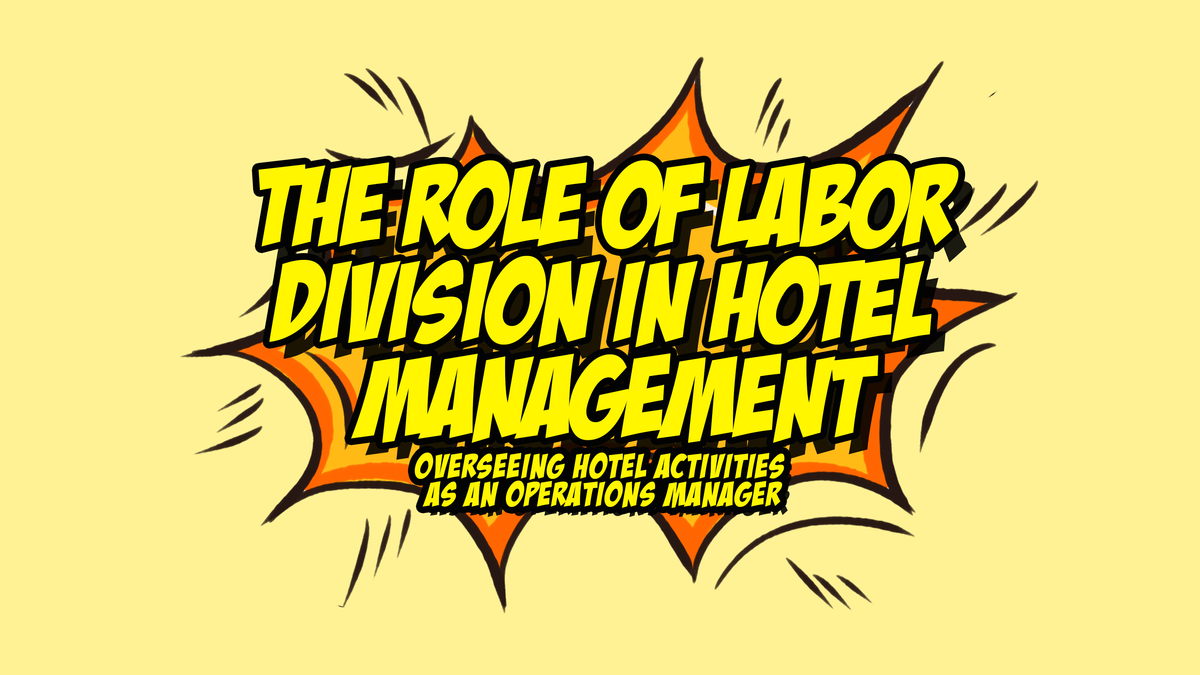In the hospitality industry, effective management of hotel operations relies heavily on the strategic division of labor. As hotels are multifaceted enterprises involving departments such as housekeeping, front office, food and beverage, sales, marketing and maintenance, the role of an operations manager is crucial in ensuring seamless coordination among these departments. The division of labor not only promotes efficiency but also enhances service quality, leading to guest satisfaction and overall profitability. A manager overseeing hotel activities must skillfully implement labor division to maximize productivity, allocate resources efficiently, and ensure that every aspect of the hotel's operations runs smoothly.
The Importance of Labor Division
Labor division, in its simplest form, is the assignment of specific tasks to employees based on their expertise, skills, and job role. This specialization allows individuals to focus on specific tasks, reducing inefficiencies caused by multitasking or role overlap. In a hotel setting, each department has its own set of responsibilities that contribute to the guest experience. A clearly defined division of labor ensures that every task—from room cleanliness to guest check-in and dining service—is executed with precision.
For an operations manager, organizing labor effectively means aligning the right people with the right tasks. It also involves balancing workloads to prevent employee burnout while ensuring that the team can handle peak demand periods such as holiday seasons or special events. This requires a deep understanding of the hotel's daily operations and the ability to adjust staffing levels dynamically.

Key Managerial Responsibilities in Overseeing Labor Division
1. Staff Allocation
One of the most vital responsibilities of an operations manager is the efficient allocation of staff across various departments. This involves not only ensuring that the right number of employees is present during each shift, but also matching the skills of individual staff members to the specific needs of the hotel at any given time. Effective staff allocation and scheduling are key to maintaining smooth hotel operations, especially in an industry where demand can fluctuate significantly depending on factors like occupancy rates, special events, holidays, and seasonal variations.

Adapting to Fluctuating Demand
In the hotel industry, staffing requirements are highly dynamic. On certain days, such as during peak holiday seasons, special events, or when the hotel is hosting conferences, the number of guests can surge, necessitating additional staff across multiple departments, particularly housekeeping, the front desk, and food and beverage services. Conversely, during off-peak periods or weekdays, fewer employees may be needed to maintain cost-efficiency without compromising service quality.
A skilled hotel manager must anticipate these variations in demand, making use of historical occupancy data, reservation trends, and event schedules to predict staffing needs. This forward-looking approach allows managers to prepare well in advance, ensuring they have the flexibility to scale up or down as necessary without disrupting hotel operations.
2. Coordination Between Departments
A hotel’s success is intricately tied to the seamless coordination between its various departments, with the manager serving as the pivotal hub for communication and strategic planning. Each department plays a critical role in delivering the overall guest experience, and their interdependence requires a manager to ensure that workflows and service delivery are cohesive. For instance, the front desk relies on the housekeeping department to ensure rooms are cleaned and prepared on time for guest check-ins. Similarly, the kitchen staff depends on guest services to convey special dietary requests, ensuring personalized dining experiences. Maintenance teams are often required to address issues like broken fixtures or heating problems that directly affect both guest services and housekeeping operations.
As the overseer, the manager's role is to eliminate any potential gaps in communication or service. This is achieved by facilitating regular team meetings, where department heads can share updates, anticipate challenges, and align their efforts toward common objectives. Through fostering a culture of collaboration, the manager ensures that all departments work harmoniously. This approach helps in quickly addressing any emerging issues, ensuring that no guest experiences a drop in service quality due to internal miscommunication. The result is a hotel operation that functions as a well-oiled machine, delivering consistent and high-quality service across all touchpoints.

3. Training and Development
Another crucial aspect of labor division is ensuring that employees are properly trained for their specific roles. A manager plays a key role in overseeing staff training, making sure that each employee has the necessary skills to perform their duties efficiently and to the high standard expected by the hotel. Effective training programs equip employees with the knowledge and confidence they need to execute tasks correctly, which in turn enhances overall service quality. Beyond improving task execution, regular training helps to keep employees engaged, motivated, and aligned with the hotel’s broader service objectives, fostering a sense of belonging and purpose within the team.
In addition to role-specific training, managers should also promote cross-training among employees. Cross-training enables staff to develop a broader skill set by learning tasks outside of their usual responsibilities. This flexibility is invaluable during busy periods or in cases of unexpected absences, allowing employees to seamlessly transition between roles as needed. For example, a front desk employee who is cross-trained in housekeeping can temporarily assist during peak times, ensuring operations continue smoothly. By encouraging cross-training, managers not only boost operational adaptability but also increase staff morale and job satisfaction, as employees gain new skills and opportunities for growth.

4. Monitoring Performance and Productivity
With a well-divided labor structure, managers can effectively monitor the performance of both individual employees and entire departments. By clearly assigning tasks and responsibilities, managers can track specific performance metrics such as guest satisfaction scores, housekeeping turnaround times, and table service efficiency. These measurable data points provide valuable insights into areas where improvements might be needed. For instance, if guest satisfaction scores decline, it may indicate a need for more attention in customer service or housekeeping efficiency.
Managers must use this performance data to make informed decisions regarding how tasks are assigned, when to adjust team composition, or when additional training is required to meet service standards. A clear division of labor simplifies this process by providing distinct accountability for each employee's role, making it easier to identify areas of success as well as areas that need attention. This structure also allows managers to address issues proactively, reallocating resources or offering retraining where necessary to ensure that the hotel operates at peak efficiency and continues to deliver high-quality guest experiences.

5. Enhancing Guest Experience
One of the primary goals of effective labor division is to ensure an exceptional guest experience. By carefully assigning specific responsibilities to the right individuals and ensuring that each department is performing at its best, the hotel can consistently deliver top-tier service. A well-organized and coordinated team enables personalized service, faster problem resolution, and the ability to anticipate guest needs before they even arise. For example, if housekeeping is running smoothly, rooms are cleaned and prepared in a timely manner, allowing the front desk to check guests in efficiently, creating a seamless experience.

Managers play a crucial role in upholding this high level of service by continuously overseeing day-to-day operations. They ensure that every team member understands their role and how their efforts contribute to the overall guest experience.
By fostering this sense of responsibility and teamwork, managers can create a structured, well-coordinated workforce. This not only leads to greater efficiency but also boosts guest satisfaction, resulting in positive reviews, repeat business, and long-term success for the hotel.
Challenges in Labor Division
While labor division brings significant benefits, managing a hotel's labor force can be challenging. High turnover rates, common in the hospitality industry, can disrupt the balance of labor and necessitate constant retraining. In addition, unexpected surges in demand can place stress on an otherwise well-organized system, requiring managers to be adept at rapid problem-solving and real-time adjustments.

Labor division also requires managers to maintain strong interpersonal skills, as they must constantly communicate with and motivate their teams. The ability to handle disputes or resolve conflicts that may arise due to task assignments or workloads is essential in maintaining harmony within the workforce.
Conclusion
The role of a manager in overseeing hotel activities is multifaceted and heavily relies on the strategic division of labor. By efficiently allocating tasks, coordinating between departments, and monitoring performance, managers can ensure that hotel operations run smoothly and that guests receive top-quality service. Labor division not only optimizes productivity but also enhances the guest experience, making it an essential managerial tool in the hospitality industry.



